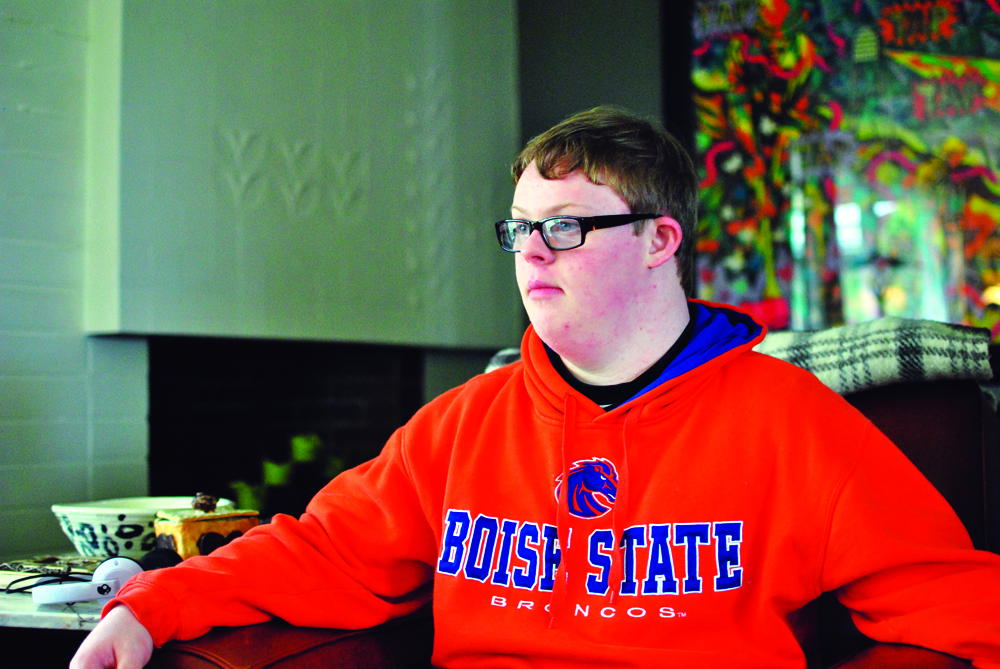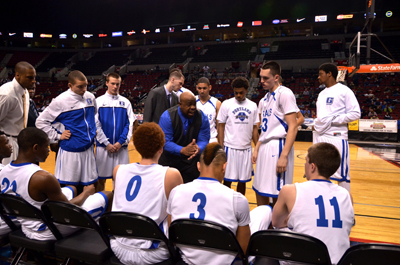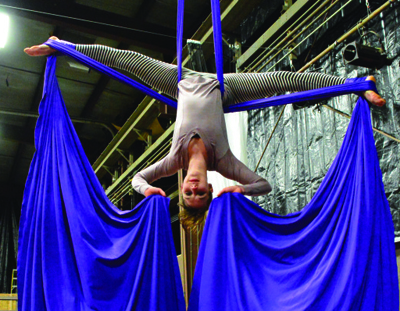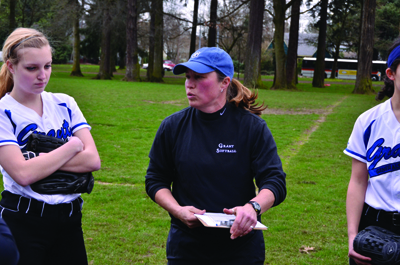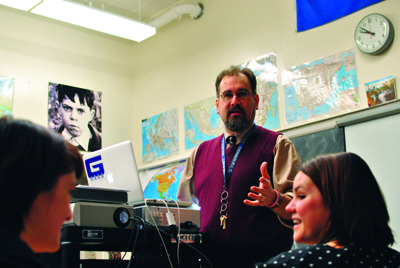Cody Sullivan, a Grant High School junior, boards the city bus for the first time. On any other day, he would have biked home. But on this particular day he decided to commute with his friends.
His parents are not by his side and there is no teacher to hold his hand. At a glance, Sullivan sounds just like a normal teenager. But he’s not. He has Down’s syndrome.
For most students at Grant who are like Sullivan, with intellectual and cognitive disabilities, the usual route is to join Life Skills classes. In these classes, qualified students get an education at a modified level, different from general education, and separate from other students. Sullivan, however, does not partake in the Life Skills classes even though he qualifies.
His parents, Shawn Sullivan and Ann Donaca-Sullivan, knew from the beginning that they wanted a different path for their son. Thinking that Life Skills classes were too segregated from the rest of the school, they opted for him to take general education classes, with assistance from a para-educator or finding modified supplements for certain classes. This decision was revolutionary for the family and turned out to be a success. Sullivan, his parents say, is thriving.
Looking at the Sullivans’ dissatisfaction with Life Skills programs in Portland Public Schools, Principal Vivian Orlen agrees that the system has a huge flaw: “It’s far too segregated,” she says.
When it comes to educating students with special needs, the one-size-fits-all approach isn’t cutting it. Orlen has plans for the future of the Special Education and Life Skills programs at Grant, with the Sullivans leading as an example that alternative solutions do exist.
Donaca-Sullivan was four months pregnant when she learned her son would have Down’s syndrome. She had gone in for an amniocentesis 10 days earlier. When her husband came home with the results, they rested on their bed as Shawn Sullivan rubbed her belly.
“Annie, I’ve got to tell you something,” he said to her. “Our son is going to have Down’s syndrome.”
Donaca-Sullivan began to cry silently. She felt scared, and then she felt her son kick for the first time.
“It was like he was telling me, ‘It’s going to be OK,’” Donaca-Sullivan says now. Though, looking back, the couple was faced with startling realities.
“There are usually so many medical complications when someone has Down’s,” says Shawn Sullivan. Among them are congenital heart defects and hypothyroidism. What loomed heavily over them was the possibility of getting an abortion.
 “One thing I had to think about was what the quality of his life would be like,” Shawn Sullivan says. Shawn Sullivan worried about an early death for his son, and the grieving that would follow. But Donaca-Sullivan refused that route.
“One thing I had to think about was what the quality of his life would be like,” Shawn Sullivan says. Shawn Sullivan worried about an early death for his son, and the grieving that would follow. But Donaca-Sullivan refused that route.
“I was five months pregnant when they offered me an abortion,” she says, shaking her head.
Donaca-Sullivan researched ways to help her son throughout the remainder of her pregnancy, looking into early intervention and physical therapies offered for him as soon as possible. By the time he was three months old, Cody Sullivan was in physical therapy learning to roll over. Since then, the family has worked to make sure their son could keep up with his peers.
Donaca-Sullivan says she has made a huge effort to make sure her son was included socially in school. As a teacher, she knew how to reach out to kids.
“I’d show a picture of Cody riding a horse and show (the other students) and say, ‘Here’s Cody on a horse, have you ever ridden a horse?’” she remembers. “Then I’d show them a picture of his chromosome count and tell them that was the only thing different between them and Cody.”
When Shawn Sullivan was growing up, not too many people understood much about Down’s syndrome. He remembers growing up as a kid and hearing about people with disabilities like Down’s, and how they’d be institutionalized. He says he never saw a person with Down’s until he was in college, and when he saw them, it surprised him.
They didn’t want their son to experience discrimination and wanted to put an end to ignorance about Down’s syndrome. In the beginning, some families were nervous about having Sullivan over for play dates, so Donaca-Sullivan offered to host them. And it worked.
“Cody has millions of friends,” says Shawn Sullivan. Donaca-Sullivan is quick to add that he’s never been bullied.
Freshman year at Grant, however, was a challenge.
The Life Skills team at Grant wanted Cody Sullivan in the classes, but his parents blocked it. They let him take a few of the classes while they sat in and watched.
“When I saw one of his classes, I just thought: ‘We have to get him out of here,’” says Shawn Sullivan. “They were teaching at his level, but it wasn’t doing anything for him.”
Donaca-Sullivan says the classes focused on the little things that Cody was getting at home. The value for him, she says, wasn’t there.
“Things that are taught in the Life Skills class are things we just teach him,” says Donaca-Sullivan. “He does his own community service, all of those skills. We see it as our responsibility to teach him those things. He’ll get those skills by doing things. Life Skills class would make him too adult dependent.”
The trouble was getting Sullivan out of the class.
His former caseworker and the current Life Skills teacher, Margarett Peoples, and others advocated for Sullivan to be in the class. It got to the point where the Sullivans were ready to hire a lawyer when Orlen stepped in.
Peoples declined to comment specifically on Cody Sullivan’s case because she is a teacher and the information is confidential. But she did say her role is to assist students and their families in making the best choices.
“Parents are part of the (Individual Education Plan) team and are there to advocate for the student. The teaching staff is there to advocate for what we see the student can do,” says Peoples. “We all make decisions based on being able to provide for the student.”
Orlen says she knew it was time to intervene.
“There was a very interesting tension between the Special Education staff and Cody’s parents, each thinking that Cody needed a particular type of schooling,” she says.
 Orlen says general education teachers can be hesitant to take on students like Sullivan due to a lack of training in addition to an already full plate. The Sullivans made it clear they could provide outside support for any of Sullivan’s teachers who needed it. Orlen thought their plan was reasonable and justified.
Orlen says general education teachers can be hesitant to take on students like Sullivan due to a lack of training in addition to an already full plate. The Sullivans made it clear they could provide outside support for any of Sullivan’s teachers who needed it. Orlen thought their plan was reasonable and justified.
Now a junior at Grant, Sullivan is thriving. He’s a member of Grant’s bowling team, enjoys going to school dances with his friends, and loves reading to the kids at Hollyrood Elementary. He recently joined a choir class this semester and can’t wait for the upcoming choir concert. “He is in a place where I always envisioned,” Donaca-Sullivan gushes.
With Sullivan’s success outside of a Life Skills class, it raises the question whether or not a more inclusive environment for those students would be beneficial. Orlen says she advocates for integrating the Life Skills class with the rest of the school.
“Historically, there has been a lot of self-containment for students with special needs,” explains Orlen. When looking at Sullivan’s situation, she thinks it’s a turn in the right direction. “Cody and students who come to us with unique learning differences help make our school a better school. We need to make the fit work.”
Orlen hopes the Life Skills classes at Grant can soon emulate those at Wilson High School, where the students help in the student store and even run a coffee stand. The changes she has in mind will possibly include some staffing changes, she says.
“We’re in a transition period,” says Shawn Sullivan. “I think we’ve started a conversation that needs to happen more often in the community.”





























